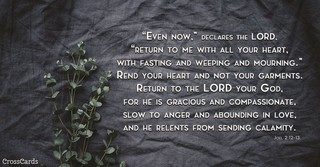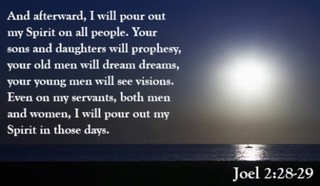
- Recent Translations
- All Translations
Joel 2:16 Meaning and Commentary
Gather the people
The common people, all the inhabitants of the land, ( Joel 1:14 ) ; summon them to meet together in the temple, in order to humble themselves before God for their sins, and implore his mercy, and seek his face to remove his judgments, or avert them: sanctify the congregation;
see that they are sanctified and prepared for a fast, as the law directs in such cases; that they may be clean and free from all ceremonial impurities; that their bodies and clothes be washed, and that they abstain from their wives, and from all lawful pleasures, as well as sinful ones: assemble the elders;
both in age and authority; that they, by their presence and example, might influence others to attend such a service: gather the children and those that suck the breast;
who were involved in the common calamity and distress, were obliged to fasting and whose cries might affect parents, and engage them the more to humiliation and repentance for their sins, which brought such, miseries, not only upon themselves, but upon their tender infants; and they might think their cries would move the pity and compassion of God; all which is suggested in the note of Kimchi: let the bridegroom go forth of his chamber, and the bride out of her
closet;
where they are adorning themselves and preparing for an interview with each other; or where they are enjoying each other's embraces and the pleasures of the matrimonial state. The sense is, let them put off their nuptial robes, and deny themselves their lawful pleasures, and betake themselves to fasting mourning, and prayer; see ( 1 Corinthians 7:5 ) . This refers to a custom among the Jews at the time of espousals when the bridegroom and bride were introduced into the nuptial chamber, where the marriage was completed; and, according to the Jewish writes it was not finished before: the blessing of the bridegroom and bride did not complete the marriage but the bringing of them into the chamber did; and then they were said to he married, though as yet they had not cohabited and then, and not before a man might enjoy his wife F24: and the marriage chamber was nothing else but a linen cloth or garment spread upon four poles over the head of the bridegroom and bride; this they called (hpwx) F25; the word is here rendered a "closet" and the same with the "chamber"; and their leaving and coming out of this signifies their abstaining from the lawful enjoyment of each other, which now they had a right unto.
F24 Maimon. Hilchot Ishot, c. 10. sect. 2, 4. Schulchan Aruch, par. 2. Eben Hezer, c. 55. sect. 2, 3.
F25 R. Elias Levita, Tishbi in (hpx) p. 119.

